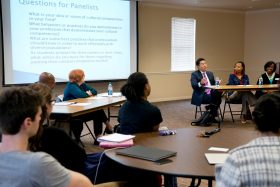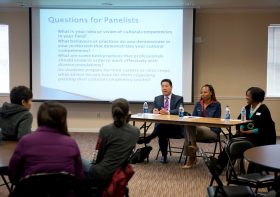Students in an Elon Core Curriculum capstone course focused on social justice and diversity heard Dec. 1 from business and nonprofit executives who offered advice for starting careers in a global economy where cultural understanding is more important than ever.

And for many people, those cultures can often be shaped by the color of their skin. To ignore the various shades that collectively make up humankind – to be “color blind” – is to ignore part of what shapes people as individuals, a panel of industry professionals shared Tuesday to upperclassmen in an Elon Core Curriculum capstone course.
That makes it harder to know a person and, by extension, to foster stronger relationships with friends, neighbors and colleagues. In a diverse nation that makes up one of the largest markets in a global economy, panelists told students, such cultural competence is necessary for career success.
Led by Assistant Professor Cherrel Miller Dyce, COR454: “Diversity and Social Justice: Building Competence” introduced students to the role diversity and cultural understanding will have throughout their careers while enhancing their “capacity to be cultural brokers.”
The new course was inspired by a class Dyce teaches in the School of Education about diversity in schools and interacting with parents of different cultures. Dyce said that bringing industry leaders to campus to share their views on cultural competence gives students additional perspective to what she teaches.
“Cultural competency is not achieved at the end of a course,” she said. “It is a lifelong journey of cultural humility, cultural self-reflection and engagement.”
Panelists were:
Lorri Allison: Human Resources Director at Alamance Community College
Shonna Brackett: Director of Innovation Operations for VF Jeanswear
Michelle Gethers-Clark: President & CEO of the United Way of Greater Greensboro
John Lew: Executive Director for HR at Elon University
Cuabeya Woods: Human Resources Manager for GKN Driveline in Alamance County

And always have another career plan in your “back pocket” should you find yourself in a job for which you feel no passion, panelists said.
More than anything, they said, understand the value of cultural competency.
“We have plants everywhere in the world. You have to be well informed and willing to observe and learn about other cultures,” Woods said. “The last thing you want to do is offend someone when you have a working relationship with them. … If you don’t know something, don’t be afraid to ask questions. Life is about learning, every moment of the day.”
Issues of economic and social inequity also surfaced during the hour-long conversation on the second floor of McCoy Commons in the Oaks Neighborhood. As head of the United Way of Greater Greensboro, Gethers-Clark raises money to help nonprofits that serve populations in need.
Her position gives her a direct understanding of the forces that limit personal development and hamper social justice, where all people have an opportunity to advance. It often surprises people of means to learn how difficult it can be for others to survive given structural and cultural barriers to success, she said.
“You’ve got to educate audiences. If you know something, you have to share it,” Gethers-Clark said. “I ask you to use social media to create awareness about things we have to change in society. Educate. Educate. Educate.”
Carla Ugboro, associate director of human resources for employer relations at Elon University, moderated the panel discussion.
“When we talk about cultural competencies, we talk about things near and dear to us. We talk about beliefs. We talk about value systems,” Ugboro told students. “The panelists we have here have a wealth of knowledge and experiences.”


